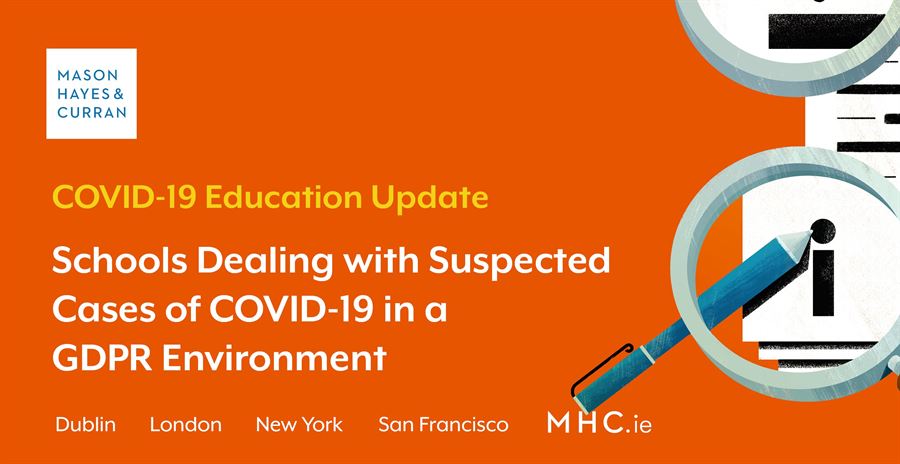Education Update: Schools Dealing with Suspected Cases of COVID-19 in a GDPR Environment

Now that we are a few weeks into the new school year, many schools predictably have to deal with suspected cases of COVID-19. This understandably causes anxiety and curiosity in equal amounts and has data protection implications for schools. We answer some of the frequently asked questions we are receiving from school leaders.
Is there an obligation on the school to inform anyone other than the parents if a student is sent home due to his/her symptoms?
No. The parents make the referral to the GP. The GP may recommend testing and, if following testing the student is confirmed positive, the HSE will begin the process of contact tracing. This means the school will in all likelihood be contacted in order for the HSE to assess the public health risk. From this point onward the process will be led by the HSE.
The HSE will contact schools to request certain information. The HSE will also seek assistance with the dissemination of information on the grounds that schools will be able to do so more quickly. There may be a situation where a class needs to stay at home.
The principal may be obliged to inform relevant staff on a need to know basis in order to manage the situation, i.e. class teacher. All families are entitled to confidentiality. The school cannot make the name known to the school community.
What is the position regarding communication if a staff member has symptoms?
Equally the same protocol applies to staff. Whilst it may be obvious to staff as to which member has symptoms, it is the prerogative of that staff member to disclose or not disclose that information. Staff should be familiar with the protocols and of their data protection responsibilities. It is the responsibility of the HSE to inform close contacts.
Does the school have any control over what parents may do on social media?
No. The school has no control over social media commentary, be it hearsay or otherwise. Parents, of their own volition, may decide to inform the school community in advance of the HSE communicating with schools. However if a school has not done so, parents should be advised as to what protocols are in place in the event of a suspected or confirmed case.
This should be part of the school response plan. The school should also advise parents that the school is bound by data protection legislation not to identify students/staff that may have symptoms or ultimately test positive. The school should also make it clear to the administrators of any parent association and/or class based WhatsApp groups that the members of the group should not engage in commentary in the event of a case being identified.
Can a parent withdraw consent to a school from forwarding a pupil’s’ personal data to the HSE on request?
No. Public Health legislation empowers the HSE to request this information from the school.
What information can a school request from a parent if the student has been sent home with a suspected case and testing was not advised by the GP?
The HSE has not advised GPs to supply schools with a note. However, there is a self-declaration Return to Educational Facility Parental Declaration Form available on the HSE website that parents can be requested to complete in advance of the student returning.
Conclusion
Schools are intimate settings. A student may be discretely sent home as a precaution but this may correctly/incorrectly be interpreted that he/she has tested positive. The inability of school management to comment on these situations because of data protection issues can give rise to understandable frustration amongst staff, students and parents.
School management would be advised to anticipate this scenario and communicate the basis for that inability to discuss or comment on such situations. Data protection is not a discretionary concept.
For more information on successfully navigating your school through the COVID-19 pandemic, contact a member of our Education team.
The content of this article is provided for information purposes only and does not constitute legal or other advice.
Share this:




